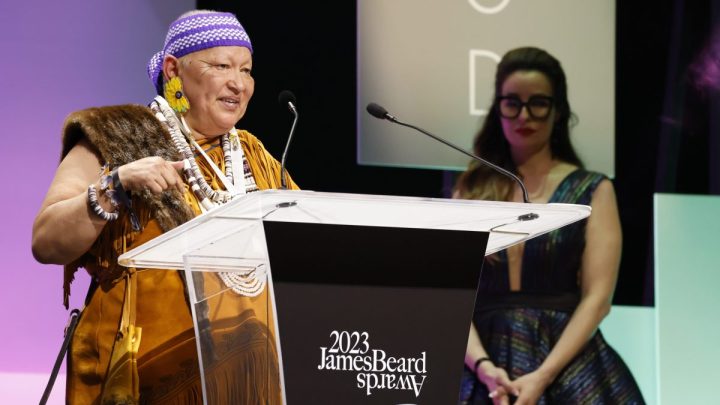
James Beard Award win spotlights Native cuisine for second year in a row
James Beard Award win spotlights Native cuisine for second year in a row

The prestigious James Beard awards, sort of like the Oscars of the food and restaurant world, were held in Chicago on Monday night.
And for the second year in a row, an Indigenous chef brought home high honors. Sherry Pocknett, a citizen of the Mashpee Wampanoag Tribe and owner of Sly Fox Den restaurant in Charleston, Rhode Island, was named best chef in the northeast region.
She’s part of a wave of Native chefs and restaurateurs bringing Indigenous foods to the mainstream and proving there’s a market for those cuisines.
Go to any powwow in the northeast and chef Sherry’s food stand is the one with the longest line. But anyone will tell you that a Sly Fox bluefish plate or a venison sandwich is worth waiting for. Pocknett accepted her award Monday night in a buckskin dress and wampum jewelry.
“I represent the whole Northeast tribes, our cooking ways. Whew, this was a surprise,” she said.
Full disclosure, I grew up eating Sherry’s food. And I can attest that like a lot of seemingly up-and-coming Native chefs, she’s actually been a treasure in her home community for decades. So why did it take mainstream foodies so long to catch up?
“You know, I ask myself that question a lot,” said Crystal Wahpepah, a Kickapoo chef.
Early in her career, Wahpepah was warned that people just weren’t interested in Indigenous ingredients and recipes. “I heard that it’s not marketable,” she said.
But when she got a chance to open her own restaurant in Oakland, she served Kickapoo food anyway: “Things I grew up on. I grew up on beans, corn squash, a lot of corn bread.”
She added that Wahpepah’s Kitchen’s customer base is growing alongside other Indigenous restaurants that have opened since the start of the pandemic in the Twin Cities, Seattle and Oklahoma City.
“Hey, it’s happenin’ man. We’re rockin,’” said Loretta Barrett Oden, a Potawatomi chef and food historian.
Since Barrett Oden first got started in the ’90s, she’s seen interest in Indigenous cuisines wax and wane. “But this time, by golly, it’s sticking.”
In part, she said that’s because social media is driving people to these restaurants — and added that recognition on the biggest night in food can’t hurt.
There’s a lot happening in the world. Through it all, Marketplace is here for you.
You rely on Marketplace to break down the world’s events and tell you how it affects you in a fact-based, approachable way. We rely on your financial support to keep making that possible.
Your donation today powers the independent journalism that you rely on. For just $5/month, you can help sustain Marketplace so we can keep reporting on the things that matter to you.

















